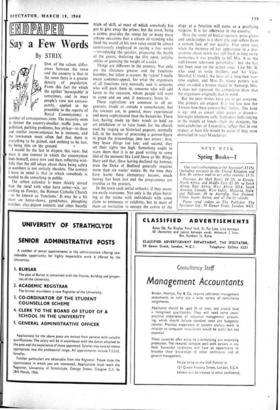11 1 1DP81?En
Say a Few Words
By STRIX
ONE of the salient differ- ences between the town and the country is that in the town there is a greater by being thin on the ground. •
I would be the last to dispute this view; but there is one context in which the countryman finds himself, every now and then, reflecting wist- fully that the old adage about there being safety in numbers is not entirely obsolete. The context I have in mind is that in which somebody is needed to do something in public.
The urban calendar is more thickly dotted than the rural with what have come—via, ac- cording to Fowler, the Roman Catholic Church —to be known as 'functions.' It may be a bit short on horse-shows, gymkhanas, ploughing matches, clay-pigeon contests and other bucolic
trials of skill, at most of which somebody has got to give away the prizes; but the town, being a centre, provides the venue for so many more urbane occasions that a citizen of standing who liked the sound of his own voice could be almost continuously employed in saying a few words —introducing the speaker, proposing the health of the guests, declaring the fête open, judging ankles or guessing the weight of a cake.
Things are different in the country. Not only are the distances greater and the functions humbler, but talent is scarcer. By 'talent' I really mean audience-appeal, for what the organisers of all functions very naturally seek is someone who will pack them in, someone who will add lustre to the occasion, whom people will want to come and see and, if necessary, listen to.
These aspirations are common to all or- ganisers, inside or outside a conurbation; but the townees are, in general, more experienced and more sophisticated than the bumpkins. These last, having made up their minds to hold an art exhibition or to raise funds for the church roof by staging an historical pageant, normally fall, in the matter of procuring a patron-figure to grace the proceedings, into two errors: first, they leave things too late; and second, they set their sights too high. Something ought to warn them that it is no good writing to some idol of the moment like Lord Snow or Mr. Ringo Starr and that, these having declined the honour, even the Duke of Bedford generally requires more than six weeks' notice. By the time they have learnt these elementary lessons, much leeway has been lost and the programmes are overdue at the printers.
In the town such initial setbacks, if they occur, are easily overcome. Not only is the place burst- ing at the seams with individuals with some claim to eminence or celebrity, but to most of them an invitation to occupy the centre of the stage at a function will come as a gratifying surprise. It is far otherwise in the country.
Here the roster of bazaar-openers, prize-givers and ankle-judges is a short one and suffers from a certain lack of star quality. Five years ago, when the memory of her appearance in a pro- gramme about newts was still fresh in long ru■tic memories, it was possible to bill Mrs. A as 'the well-known television personality': but she has not been seen on the screen since. Like Mr. B, %%he used to write thrillers. and Air Vice- Marshal C (retd.), the hero of a forgotten war- time exploit, and Miss D. whose pottery was once awarded a bronze medal in Antwerp, Mrs. A does not represent the compulsive draw that the organisers originally had in mind.
But the poor brutes have got to get someone. The printers are exigent. It is too late now for 'I-know-how-busy-you-are-but' letters. The bunt is up: and as covert after covert is drawn- late-night telephone calls. front-door bells ringing in the middle of lunch—their shy denizens, the mini-celebrities of Loamshire. reflect that in one respect at least life would be easier if they were domiciled in (say) Manchester.


































 Previous page
Previous page